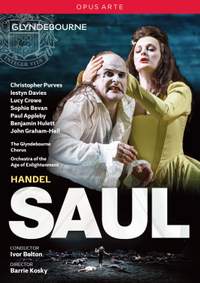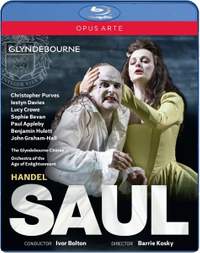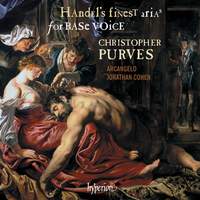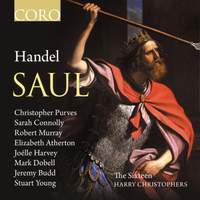Interview,
Christopher Purves on Glyndebourne's Saul
 Barrie Kosky's phantasmagorical production of Handel's Old Testament oratorio was the palpable hit of last year's Glyndebourne Festival: The Guardian described it as 'a theatrical and musical feast' and The Independent as 'a brilliant, landmark production', and the recent DVD and blu-ray (released at the end of May on Opus Arte) scooped the Opera and Music Theatre prize at the Royal Philharmonic Society Awards last month.
Barrie Kosky's phantasmagorical production of Handel's Old Testament oratorio was the palpable hit of last year's Glyndebourne Festival: The Guardian described it as 'a theatrical and musical feast' and The Independent as 'a brilliant, landmark production', and the recent DVD and blu-ray (released at the end of May on Opus Arte) scooped the Opera and Music Theatre prize at the Royal Philharmonic Society Awards last month.
At the heart of a superb ensemble cast was Christopher Purves's insecure, jealousy-driven monarch, praised by the Financial Times as 'a triumph of vocal accomplishment and dramatic insight' and unravelling with an intensity that's as compelling as it is terrifying to watch.
I spoke to Chris last week about how he and Kosky brought this character off the page to such vivid effect during the rehearsal-process…
This is a role you already knew well, having recorded it for Harry Christophers a couple of years ago - what sort of expectations did you have when you signed up for this production, and were they met or overturned?
I try not to have any expectations when I start work on a project, because they invariably get in the way! But when I signed the contract, and they said ‘Will you also do the voice of Samuel?’ I thought ‘OK, that’s good – I like that idea very much’. But my next thought was ‘Well there’s not actually a huge amount for Saul to do' (two or three arias plus what I think is some very interesting accompanied recitative). Really I didn’t think it was about Saul, but about the other characters and how they affect his life. I remember saying to Barrie Kosky: ‘I honestly don’t know what the hell I’m going to do down in Glyndebourne for six weeks! This is really going to be a little holiday for me!’. And he said ‘What does it say on the cover of your score? I think we’ll find something for you to do…’. And by god, he did!
Stagings of Handel oratorios have become increasingly common over the last fifteen years or so, and this was by no means your first: how does the production compare to something like Katie Mitchell’s Jephtha for WNO (which I saw you in about ten years ago), or Peter Sellars’s Theodora at Glyndebourne?
I actually understudied Valens (in the Sellars Theodora), and also did Katie Mitchell’s Glyndebourne staging of the St Matthew Passion – so I’ve done lots of oratorio on stage! I remember being incredibly excited when I did that Jephtha, because it was the first time I’d really felt the power of theatre in opera.
The thing about Barrie (as in fact he says on the trailer for the DVD) is that for him the performers must always be at the forefront of the production and I think that what was interesting about that Jephtha and Theodora was that you were always very aware of the process. When I think of that Theodora the first thing that comes to mind is that execution scene, with the lethal injections, but I don’t think of anything but the performers with Saul – and perhaps that’s where this was slightly different from previous stagings of Handel oratorios. OK, there is that extraordinarily beautiful bit at the beginning of Act Two, with all the candles on stage and the organ rising up from underneath, but that’s an isolated coup de theatre which almost heightens the need for human contact.
How did Kosky's staging alter the way you sang the role? Was what you did here vocally very different from your studio recording?
It would be so nice to go back and re-record, with the knowledge that I have from this production; when you tap into the drama, it feeds into everything that you do thereafter, so you can never really go back to how you sang it before. When I was doing that studio recording, I remember trying to be as dramatic as possible, but obviously it doesn’t quite work without the theatrical content. Here we had absolute licence to make it as theatrical as possible – to come away from just making beautiful sounds, and present something that’s flesh and blood. When people shout at each other they do come off the voice, they do crack – and that’s what I’m always trying to do, to create a conversation that I’d be having in normal speech. It's meat and drink to me: I love being able to investigate a character and to present it in the same way that you would in a play, and if that takes you away from The Voice Beautiful then so be it.
How much of the physicality of the role came from you and how much came from Barrie?
I think Barrie lit the blue touch-paper, and obviously didn’t retreat! It was not so much a question of what he wanted as what we needed: if collaboration is a question of one person having an idea and other people running as far as they can with it then that was exactly what we did. Take the very end of Act I, where I’m pacing and muttering ‘I am the king. I AM the king. I am the KING!!!’ - that was something totally spontaneous that came in after two or three performances. Barrie was away on holiday by that point, and as soon as I came offstage I texted him saying ‘Is this right, do you think?’; his immediate reply was ‘Well, it must be right if you said it!’
I notice that Barrie talks a lot about Macbeth and King Lear in the trailer – was there much reading and research about madness on stage, or was it more a case of trying things out as they arose in the rehearsal-room?
I don’t think we tried to emulate or borrow anything from Shakespeare, but there was an interesting moment at the dress rehearsal where someone came up to Barrie and introduced himself as Professor Somebody – an expert in eighteenth-century madness as depicted on stage. And there was a pause as we thought ‘Oh good god we never ever thought about that…!’, but then he said ‘and everything you did was absolutely spot-on!’. But that was just happenstance – I mean, we hadn’t got a clue! We hadn’t done any research, and we’d had the arrogance to think we could depict eighteenth-century madness on stage and get away with it! But Barrie’s maxim was very much ‘Trust your instincts, and they probably will be right’.
Saul appears pretty unhinged from the off in this production – did you start rehearsing with that perspective in mind, and how do you think it alters sympathy for the character?
Going off at a tangent for a moment, I did Wozzeck years ago with Richard Jones for WNO, and I remember him saying ‘The extraordinary thing about madness is that the person who’s mad thinks he’s the sanest’. I think what we were trying to show in that opening sequence was the state that people were in; bear in mind that it's half an hour before we get through the first chorus, so there’s an awful lot of background stuff that we needed to try and make sense of. Imagine being at war for years with the Philistines, with everything that Saul has tried to do having been crushed; imagine being the King, looking at your subjects and trying to apologise and having to say ‘I’m really sorry, but I don’t have the answers...’. And then along comes this feeble little kid and almost by divine intervention he manages to kill the person who’s terrorised you for the past five or ten years. If you look at the way the dancers are dancing and the chorus are behaving in that opening scene, there’s jubilation and relief, yes, but there's also manic behaviour and hysteria. So in that context I think that if Saul does look at little bit mad, that’s not entirely surprising; but that then triggers the jealousy that he feels towards David, this little whippersnapper who becomes godlike in the space of the first few minutes. Whilst he’s not yet ‘mad’ in the sense that he is later on, he’s already not making decisions based on rationality, but on this jealousy. One of the characters says to him ‘Tis your disease’ – and that’s interesting because there’s surely an echo of Othello’s ‘green-eyed monster’ there. So psychologically there's no real turning point as such: his behaviour doesn’t alter overnight, but just becomes more and more grotesque.
As the rehearsal-process went along, did you have any vibes about how the production was going to be received? There are a few potentially controversial moments, such as your scene with the Witch of Endor...
I remember the tremendous excitement that we all felt as we were going through the rehearsal period; now and again, David Pickard, the general manager, would come into the rehearsal room and go out absolutely shell-shocked but thinking ‘We might have a hit on our hands!’. And by the time we got to rehearsing on stage with the orchestra, the buzz was so strong; I recall saying to David after the final rehearsal ‘There’s got to be a DVD, you know that, don’t you? We cannot let this go past without there being a record’.
Another thing about putting oratorios on stage is that a lot of opera-lovers roll their eyes and think ‘Saul?! Aren’t there enough Handel operas to put on?!’. But I think when you have the imagination and you have the cast, it's ripe for the picking. I think it’s very important, too, to recognise Ivor Bolton’s contribution in all of this: at no point did he ever say to me ‘Hmm, can we not do that?!’. There are conductors who put their foot down, but he deserves enormous credit because he was always so behind what we were doing on stage, to the extent that he would even butt in with suggestions! It was a total collaboration: when the chorus get behind you, the orchestra, the stage-management, you cannot fail. And I think that’s really what the DVD is for me – it’s a testament to imagination, and it was the most fun I’ve ever had.
Christopher Purves (Saul), Iestyn Davies (David), Lucy Crowe (Merab), Sophie Bevan (Michal), Paul Appleby (Jonathan), Benjamin Hulett (High Priest) & John Graham-Hall (Witch of Endor)
Available Format: DVD Video
Christopher Purves (Saul), Iestyn Davies (David), Lucy Crowe (Merab), Sophie Bevan (Michal), Paul Appleby (Jonathan), Benjamin Hulett (High Priest) & John Graham-Hall (Witch of Endor)
Available Format: Blu-ray
Related recordings
Christopher Purves (bass), Arcangelo, Jonathan Cohen
Available Formats: CD, MP3, FLAC, Hi-Res FLAC
Christopher Purves (Saul), Sarah Connolly (David), Robert Murray (Jonathan), Elizabeth Atherton (Merab), Joélle Harvey (Michal), Mark Dobell (High Priest), Jeremy Budd (Witch of Endor) & Stuart Young (Ghost of Samuel), Arcangelo, Jonathan Cohen
Available Formats: 3 CDs, MP3, FLAC






